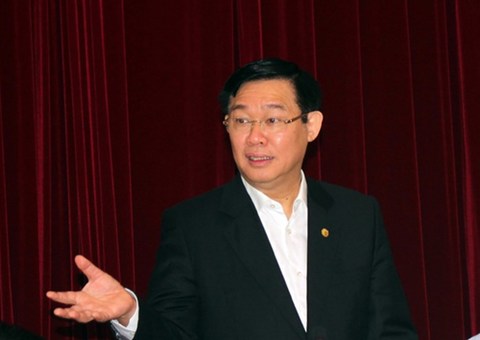
Deputy Prime Minister Vuong Dinh Hue speaks at a meeting with the ministry on Tuesday on mid-term public investment. — Photo VGP
Poor coordination between the Ministry of Planning and Investment and other ministries and localities is to blame for the late disbursement of public investment, said Deputy Prime Minister Vuong Dinh Hue.
At a meeting with the ministry on Tuesday on mid-term public investment, the Deputy PM also pointed out that there were shortcomings in legal documents on public investment, including the Law on Public Investment and a number of the Government’s decrees on implementing it.
He asked the ministry to cooperate with related State bodies to review these documents in order to mend problems that need to be revised before May, when the National Assembly convenes its next session.
Slow administrative reforms and a lack of efforts to improve management and leadership capacity were another reason, he said, admitting that the Government’s target of disbursing 100 per cent of public investment capital in 2018 was a challenge.
In 2016, 91.3 per cent of public investment capital approved was disbursed, although the figure for 2017 decreased to 86 per cent.
Hue said next week he would head a team to inspect the public investment disbursement at some key localities and ministries which use a lot of State budget money such as Ha Noi and HCM City, as well as the ministries of transport, health, agriculture and rural development, and education and training.
According to Hue, the inspection is aimed at figuring out reasons for the sluggishness and those who are responsible. It will also help to detect and amend shortcomings in related legal documents.
Speaking at the meeting, Deputy Minister of Planning and Investment Le Quang Manh said the Government had until now assigned the allocation of about VND1.64 quadrillion (US$ 72.16 billion) or 91.3 per cent of the total amount of public investment capital approved by the National Assembly for the 2016-2020 period. The money is supposed to be used for around 9,600 projects.
According to the ministry, the slow disbursement is due to difficulties in balancing the State budget for public investment, the failures of localities in reviewing, adjusting and phasing out projects or seeking alternative sources of capital for those that have not been allocated enough in the mid-term public investment plan.
Besides, the public-private partnership model is not attractive enough to draw private investors in public infrastructure and public service development projects.
The ministry also blames localities for failing to abide by regulations, criteria and priorities in allocation of public investment capital, making it difficult for the ministry to grasp a full picture of the overall plan for capital allocation.
The ministry worries that in the remaining two years out of the five-year period it will fail to disburse all the capital as approved by the National Assembly. The ministry therefore proposes that the Government prepares scenarios of public investment disbursement for the remaining two years to define demand and disbursement ability which will serve as a basis to review and adjust the mid-term public investment plan. — VNS